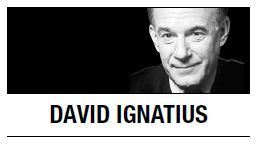A year ago this month, President Obama was delivering a eulogy in Charleston, South Carolina, after the mass shooting in a church there. As he neared the end, he took a long pause and then began singing “Amazing Grace.”
It was an unforgettable, transcendent moment. Michelle Obama had reportedly cautioned him against singing, but Obama told her on the trip to Charleston that he might do it anyway. Until he began, even he probably wasn’t sure.
Peter Manseau wrote in The Atlantic magazine about the power of the pause: “During those 13 seconds, Obama looks out over the crowd, then down at his notes, then he shakes his head slightly. Watch behind him; the assembled clergy seem momentarily unsure what will happen next.” And then the president’s low, melodious voice hit the first prolonged notes.
Over this past year, as Obama has embraced the final quarter of his presidency, there have been other, similar moments. Our first African-American chief executive has sometimes taken wing — and then, sadly, been brought back to earth by the real-life encumbrances of terrorism, domestic political division and his own limitations as a political leader. Fleetingly, we get a glimpse of his potential for greatness as a president.
Obama’s presidency has been striking in the clarity of his diagnosis of the nation’s ills and his inability to cure them. He passionately wanted to “turn the page,” as he put it back in 2009 — to restore the economy, keep the country out of new, entangling wars, and find a way to govern across the partisan divide. But he discovered the formidable obstacles.
In Obama’s first inaugural address, in language that eerily prefigured the rise of Donald Trump, the new president worried about “a sapping of confidence across our land; a nagging fear that America’s decline is inevitable.” He said in that speech’s well-remembered, now-haunting line: “To the Muslim world, we seek a new way forward, based on mutual interest and mutual respect.”
Seven years later, Obama struggles with the rise of the Islamic State, and a clash of civilizations that seems closer than ever. Could he or anyone have imagined that the presumptive Republican nominee to succeed him would propose to ban Muslims from entering the United States?
Obama’s shortcomings as president inevitably get the most news coverage. We’re in a business, after all, that will never post the headline, “Plane lands safely.” But in this period of national difficulty, it’s good to remember not just Obama’s setbacks but the side of him that demonstrates what resilience looks like. These moments remind us of America’s exceptional character, even in its current, ugly paralysis.
One such vignette was Obama’s eulogy a year ago for Beau Biden, the vice president’s son, who died at 46 of brain cancer. Obama managed to evoke not just Beau and his father, Joe, but the vocation of life-affirming politics that they embodied: “That’s what our country was built on — men like Beau,” Obama said. “We don’t have kings or queens or lords. We don’t have to be born into money to have an impact. We don’t have to step on one another to be successful.” Trump’s candidacy was only a gleam in the eye back then, but Obama seemed to sense it coming like a storm in the air.
Obama’s message when Muhammad Ali died was another such moment, when he evoked what had made “The Greatest” so great — not just that he was a sublime boxer but that he “fought for what was right.” Who knew that Obama had a pair of Ali’s boxing gloves in his private study? Or that he kept, nearby, the iconic photograph of a triumphant Ali brandishing his fist over Sonny Liston?
Grief seems to bring out the passion in Obama’s sometimes dry personality. Recall the statements Obama has made after the heartbreaking series of mass shootings during his presidency: Tucson; Aurora; Newtown; Charleston; Roseburg; San Bernardino; Orlando. Each time he looks grayer; sadder, angrier, more determined somehow to defy the political laws of gravity and stop killers from obtaining deadly weapons so easily.
Obama’s complicated legacy will take years for historians to unravel. But it’s noteworthy that in the final year of his presidency, his approval rating has climbed above 50 percent, while the unfavorable rating for Trump now stands at 70 percent, according to the latest Washington Post poll.
Perhaps this will be Obama’s eleventh-hour achievement: a gathering appreciation of his leadership and a growing revulsion at the tactics of his would-be successor.
By David Ignatius
David Ignatius’ email address is
davidignatius@washpost.com. — Ed.
(Washington Post Writers Group)








